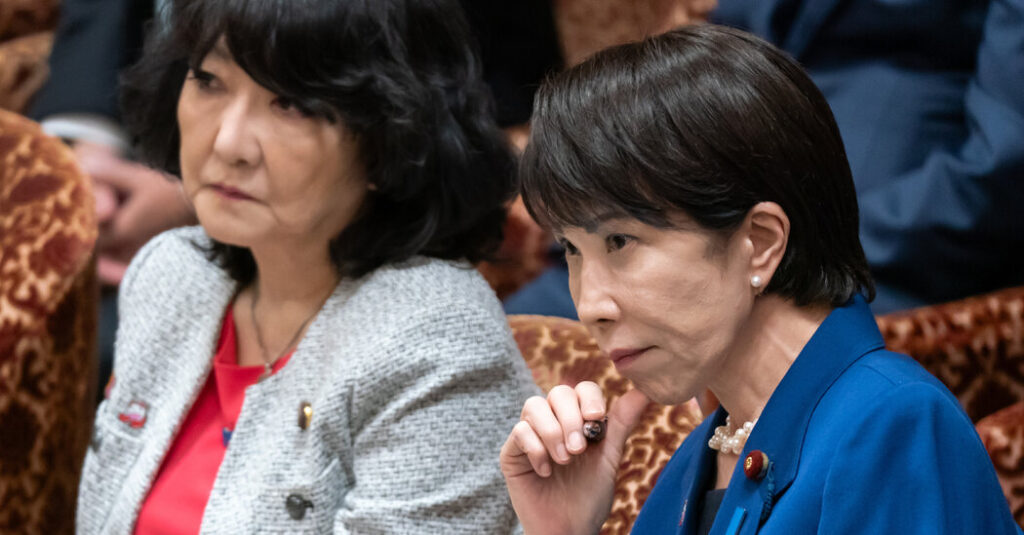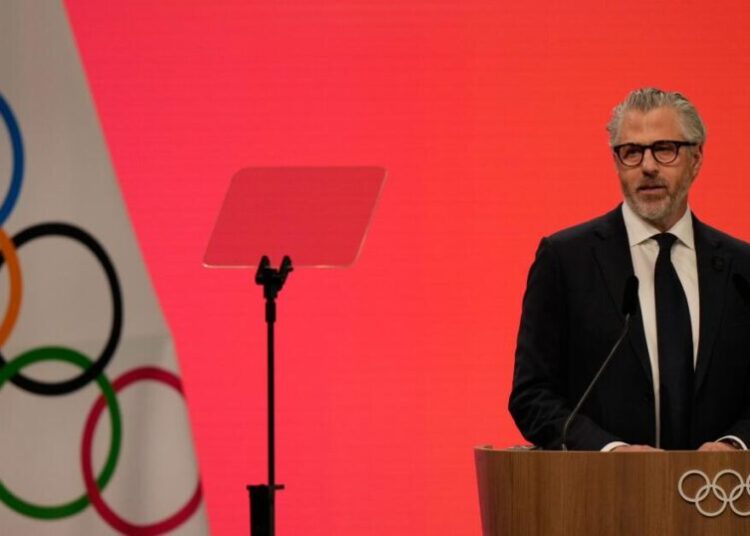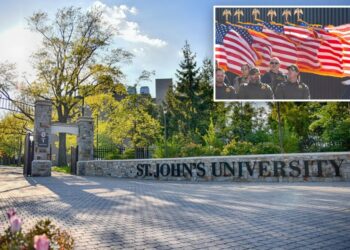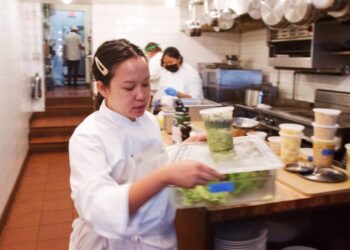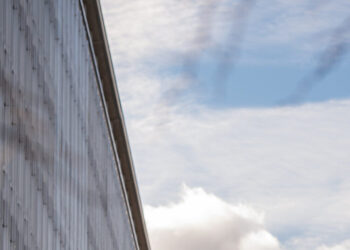Three weeks ago, it looked like Japan’s prime minister had made the biggest blunder of her early tenure with an off-the-cuff comment that ignited a diplomatic showdown with China.
Now Sanae Takaichi is in a position of strength at home, even though neither Japan nor China is backing away from the dispute.
Ms. Takaichi caused the row by signaling her country’s willingness to defend Taiwan in the event of Chinese military action. China, which regards the island democracy as its territory, responded by curtailing trade and tourism to Japan.
But the economic costs have not dented her popularity among Japan’s voters. If anything, they have increased her appeal as a conservative strong on defense.
Young citizens in particular have praised her stance, in a sign that she has struck a cord with a Japanese electorate that has been increasingly willing to question the nation’s longstanding pacifism. And she has been backed by Japanese, American and Taiwanese officials.
It is too early to say how the spat with China will color Ms. Takaichi’s legacy — she has been in office for less than six weeks. But it is likely to prove a defining early moment of her prime ministership.
The furor began on Nov. 7. in the Diet, Japan’s Parliament. An opposition lawmaker asked Ms. Takaichi how her administration would designate an effort by China to blockade or invade Taiwan. She said that would constitute a “survival-threatening situation,” implying that in such a scenario Japan would deploy its military in Taiwan’s defense.
While she was repeating what has long been Japan’s prevailing, if rarely verbalized, policy, her remarks caused an uproar in Beijing. The ensuing diplomatic row has brought streams of vitriol, military posturing in contested waters and appeals to the United Nations and President Trump.
Many political analysts and administration officials believe that Ms. Takaichi’s comment was not a calculated move, but rather spontaneous and possibly provoked by the questioner.
“The consensus is it wasn’t really a deliberate move on her part,” said Tobias Harris, the founder of Japan Foresight, a political risk advisory firm. “But once you’ve said that, it’s very difficult to concede anything, because then it’s a question of whether it’s Japan’s prevailing policy or is it not?”
“That is why I feel very bearish about this being resolved anytime soon,” Mr. Harris said.
The sparring comes at a time when anti-China sentiment has increased in Japan, influenced by narratives of Chinese over-tourism, military expansion near Japanese islands and reports blaming Chinese nationals for driving up rents and land prices by buying assets in Japan.
This attitude is especially shared among younger generations, a key demographic for Ms. Takaichi’s Liberal Democratic Party, whose popularity has weakened because it has strained to appeal to younger voters.
A nationwide poll conducted last weekend by the Yomiuri Shimbun, Japan’s largest newspaper, showed that 64 percent of those aged 18-39 approved of the Takaichi government’s stance toward China. That compared to a 43 percent approval rate from those over 60, while the overall approval was 56 percent.
On Tuesday evening, Mai Hosoda, 23, and Rino Nakatani, 24, were on their way home from work at a bank in Nara, a city near Kyoto famous for free-roaming deer that inhabit its parks. They both said they were supportive of the tough stance Ms. Takaichi, who hails from Nara, has taken toward China.
Ms. Nakatani said she had recently seen a smattering of social media posts of Chinese tourists feeding strange things to the Nara deer, and that her perception of China had worsened because of the diplomatic spat.
Ms. Hosoda agreed. “It’s a good thing as a leader to have a firm stance about their own country,” she said.
On the world stage, allies have rallied to Ms. Takaichi’s defense. Taiwan has lifted all restrictions on imports of Japanese food, including those on seafood that have been in place since the 2011 Fukushima nuclear disaster. Taiwan’s president posted a video of himself eating sushi that included Japanese scallops and yellowtail.
The top American diplomat in Japan also voiced support. “Directly from the president and from myself and from the embassy for the Prime Minister, we have her back,” U.S. Ambassador George Glass said last week.
For some observers, an incendiary comment about China from Ms. Takaichi has always been in the cards given her long-held nationalist leanings and public statements.
Like many right-wing Japanese lawmakers, Ms. Takaichi has been a frequent visitor to Tokyo’s Yasukuni Shrine, where Japan’s war dead, including some war criminals, are commemorated. Her visits have consistently sparked official protests and condemnation from China, where Japanese troops committed atrocities during World War II, as well as South Korea, a former colony of Japan.
However, some fear that tensions have risen too high. A former prime minister, Shigeru Ishiba, criticized Ms. Takaichi, telling a local news station this week that Japan’s response to a Taiwan contingency was not a matter to be discussed so openly.
“Successive administrations have handled this with the utmost caution. That is how sensitive the Japan-China relationship is,” he said. “This is not about being able to say whatever one wants. Nor is it about simply gaining higher approval ratings.”
Beijing’s reactions have included asking the United Nations to distribute a strong criticism of Ms. Takaichi’s remarks to member countries. On Tuesday, Japan said it scrambled fighter jets after detecting a drone, believed to be Chinese, near an island in its south where it is planning to deploy antiaircraft missiles.
Beijing has also sought to ratchet up economic pressure. It has halted seafood imports from Japan and advised its citizens to avoid traveling to the country, warning that visiting it now poses risks to their safety. Hong Kong authorities have also urged residents to exercise vigilance in visiting Japan.
Visitors from mainland China and Hong Kong accounted for over a quarter of all foreign arrivals to Japan last year. The dispute with Beijing could cost Japan as much as $1.2 billion in tourist spending by the end of the year, according to China Trading Desk, a research firm.
Yoshitsugu Tone runs a dried-foods shop in Nara that he said is frequented by Chinese tourists, who come to buy Goji berries. He is worried business will be hurt by a drop off in Chinese visitors and said that Ms. Takaichi shouldn’t have provoked China.
“Japan also did wrong things in the past against China and Korea,” said Mr. Tone, 85. The prime minister “stepped on the tail of the tiger, when she should have just left things untouched.”
Earlier this month, a Chinese diplomat in Japan attacked Ms. Takaichi directly, posting a call on social media to cut off her “filthy head.” Chinese state media has started releasing cartoons depicting her in outfits linked with wartime Japan.
“The Chinese side believes that the more pressure they apply to Japan, the more submissive the Japanese will become — the more difficult Ms. Takaichi’s position will become,” said Ichiro Korogi, a China expert and professor at Kanda University of International Studies.
The problem is that Ms. Takaichi has already clarified that she will not retract her statements, Mr. Korogi said. Beijing’s recent actions, he said, are boosting Ms. Takaichi’s popularity.
He added: “The more pressure China puts on Japan, the more Japanese people actually unite.”
River Akira Davis covers Japan for The Times, including its economy and businesses, and is based in Tokyo.
The post Spat With China Becomes an Asset for Japan’s New Leader appeared first on New York Times.
